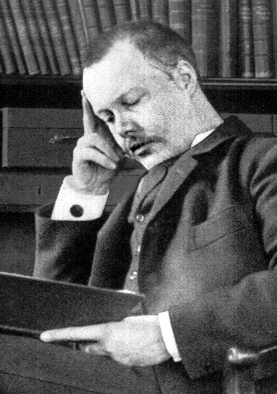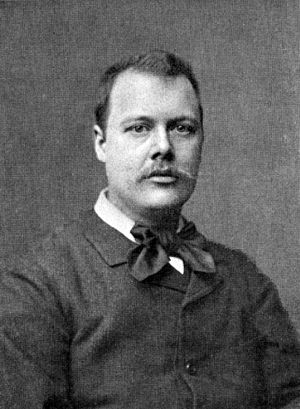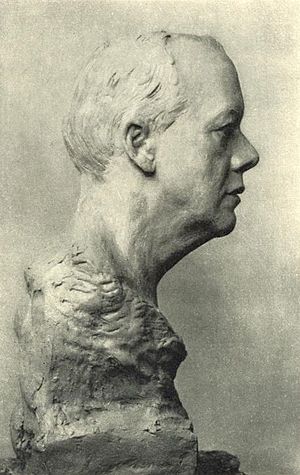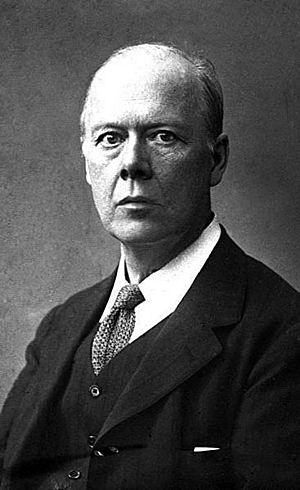Houston Stewart Chamberlain facts for kids
Quick facts for kids
Houston Stewart Chamberlain
|
|
|---|---|

Chamberlain in 1895
|
|
| Born | 9 September 1855 Southsea, Hampshire, England
|
| Died | 9 January 1927 (aged 71) |
| Nationality | British, German |
| Spouse(s) |
Anna Horst
(m. 1878; div. 1905)Eva von Bülow-Wagner
(m. 1908–1927) |
| Parent(s) | William Charles Chamberlain (1818–1878) Eliza Jane Hall (–1856) |
| Relatives | Basil Hall Chamberlain (brother) |
Houston Stewart Chamberlain (/ˈtʃeɪmbərlɪn/; 9 September 1855 – 9 January 1927) was a British-German philosopher who wrote works about political philosophy and natural science.
Contents
Early life and education
Houston Stewart Chamberlain was born in Southsea, Hampshire, England, the son of Rear Admiral William Charles Chamberlain, RN. His mother, Eliza Jane, daughter of Captain Basil Hall, RN, died before he was a year old, leading to his being brought up by his grandmother in France. His elder brother was Japanologist and Tokyo Imperial University professor Basil Hall Chamberlain. Chamberlain's poor health frequently led him to being sent to the warmer climates of Spain and Italy for the winter. This constant moving about made it hard for Chamberlain to form lasting friendships.
Cheltenham college
Chamberlain's education began at a lycée in Versailles and continued mostly in continental Europe, but his father had planned a military career for his son. At the age of eleven he was sent to Cheltenham College, an English boarding school that produced many Army and Navy officers. Chamberlain grew up in a self-confident, optimistic, Victorian atmosphere that celebrated the nineteenth century as the "Age of Progress"; a time of growing wealth, scientific discoveries, technological advances and democratic political reforms; a world that many Victorians expected to get progressively better and better with Britain leading the way for the rest of the world.
Chamberlain deeply disliked Cheltenham College, and felt lonely and out of place there. The young Chamberlain was "a compulsive dreamer", more interested in the arts than in the military, and he developed a fondness for nature and a near-mystical sense of self.
Chamberlain's major interests in his studies at Cheltenham were the natural sciences, especially astronomy.
The prospect of serving as an officer in India or elsewhere in the British Empire held no attraction for Chamberlain. In addition, he was a delicate child with poor health. At the age of fourteen he had to be withdrawn from school. After Cheltenham, Chamberlain always felt out of place in Britain, a society whose values Chamberlain felt were not his values, writing in 1876: "The fact may be regrettable but it remains a fact; I have become so completely un-English that the mere thought of England and the English makes me unhappy". Chamberlain then travelled to various spas around Europe, accompanied by a Prussian tutor, Mr Otto Kuntze, who taught him German and interested him in German culture and history. Fascinated by Renaissance art and architecture, Chamberlain learned Italian and planned to settle in Florence for a time.
University of Geneva
Chamberlain attended the University of Geneva, in French-speaking Switzerland. There he studied under Carl Vogt, who was a supporter of racial typology, as well as under chemist Carl Gräbe, botanist Johannes Müller Argoviensis, physicist and parapsychologist Marc Thury, astronomer Emile Plantamour, and other professors. Chamberlain's main interests as a student revolved around systematic botany, geology, astronomy, and later the anatomy and physiology of the human body. In 1881, he earned a baccalauréat ès sciences physiques et naturelles ("baccalaureate in physical and natural sciences").
Wagnerite
At the age of twenty three Chamberlain first heard the music of Richard Wagner, which struck him with all the force of a religious revelation. He then became a Wagnerite and an ardent Germanophile. Further increasing his love of Germany was that he had fallen in love with a German woman named Anna Horst, and she with him. As Chamberlain's wealthy, elitist family back in Britain objected to him marrying the lower middle-class Horst on the grounds that she was socially unsuitable for him, this further estranged him from Britain.
Chamberlain settled in Dresden, where he immersed himself in philosophical writings. It was during his time in Dresden that Chamberlain came to embrace völkisch thought through his study of Wagner, and from 1884 onwards, anti-Semitic and racist statements became the norm in his letters to his family in Britain.
During his time in Dresden, Chamberlain like many other völkisch activists became fascinated with Hindu mythology and legend, and learned Sanskrit in order to read the ancient Indian epics like the Vedas and the Upanishads in their original form. In these stories about ancient Aryan heroes conquering the Indian subcontinent, Chamberlain found a very appealing world governed by a rigid caste system with social inferiors firmly locked into their place; full of larger-than-life Aryan gods and aristocratic heroes and a world that focused on the spiritual at the expense of the material. Since by this time, historians, archaeologists and linguists had all accepted that the Aryans ("light ones") of Hindu legend were an Indo-European people, Chamberlain had little trouble arguing that these Aryans were in fact Germanic peoples, and modern Germans had much to learn from Hinduism. The popularity of the Hindu texts with the völkisch movement explains why the swastika, an ancient Indian symbol, was adopted by the völkisch activists as one of their symbols.
Vienna years
In 1889, he moved to Austria. During this time it is said his ideas on race began taking shape.
As a leading Wagnerite in Vienna, Chamberlain befriended a number of other prominent Wagnerites, such as Prince Hohenhohe-Langenburg, Ludwig Schemann, Georg Meurer, and Baron Christian von Ehrenfels. The most important friendship that Chamberlain made during his time in Vienna was with German Ambassador to Austria-Hungary, Philipp, Prince of Eulenburg, who shared Chamberlain's love of Wagnerian music. Besides being a passionate Wagnerite, Eulenburg was also an anti-Semite, an Anglophobe and a convinced enemy of democracy who found much to admire in Chamberlain's anti-Semitic, anti-British and anti-democratic writings.
Die Grundlagen (The Foundations)
In February 1896, the Munich publisher Hugo Bruckmann, a leading völkisch activist who was later to publish Mein Kampf commissioned Chamberlain to write a book that was intended to summarize all of the achievements of the 19th century.
In October 1899 Chamberlain published his most famous work, Die Grundlagen des neunzehnten Jahrhunderts, in German. The book sold well: eight editions and 60,000 copies within 10 years, 100,000 copies by the outbreak of World War I and 24 editions and more than a quarter of a million copies by 1938. The success of The Foundations after it was published in October 1899 made Chamberlain into a celebrity intellectual.
The Foundations is a pseudo-scientific "racial history" of humanity from the emergence of the first civilizations in the ancient Near East to the year 1800. It argues that all of the "foundations" of the great 19th century, which saw huge economic, scientific and technological advances in the West, were the work of the "Aryan race". Die Grundlagen was only the first volume of an intended three-volume history of the West with the second and third volumes taking up the story of the West in the 19th century and the looming war for world domination in the coming 20th century between the Aryans on one side vs. the Jews, blacks and Asians on the other side.
Chamberlain never wrote the third volume.
Peoples defined as Aryans
Chamberlain grouped all European peoples – not just Germans, but Celts, Slavs, Greeks, and Latins – into the "Aryan race", a race built on the ancient Proto-Indo-European culture. In fact, he even included the Berber people of North Africa in the Aryan race.
At the helm of the Aryan race, and, indeed, all races, according to Chamberlain, were the Germanic or Teutonic peoples, who had best preserved the Aryan blood. Chamberlain used the terms Aryan, Indo-European and Indo-Germanic interchangeably, but he went out of his way to emphasise that purest Aryans were to be found in Central Europe. Much of Chamberlain's theory about the superiority of the Aryan race was taken from the writings of the French aristocrat Arthur de Gobineau, but there was a crucial difference in that Gobineau had used the Aryan race theory as a way of dividing society between an Aryan nobility vs. racially inferior commoners whereas Chamberlain used the Aryan racial theory as a way of uniting society around its supposed common racial origins.
Aryan race virtues
Everything that Chamberlain viewed as good in the world was ascribed to the Aryans. For an example, in The Foundations Chamberlain explained at considerable length that Jesus Christ could not possibly be a Jew, and very strongly implied that Christ was an Aryan.
Chamberlain's tendency to see everything good as the work of the Aryans allowed him to claim whoever he approved of for the Aryan race, which at least was part of the appeal of the book in Germany when it was published in 1899. Chamberlain claimed all of the glories and achievements of ancient Greece and Rome as due entirely to Aryan blood. Chamberlain wrote that ancient Greece was a "lost ideal" of beautiful thought and art that the modern Germans were best placed to recover if only the German people could embrace Wagner.
The antithesis of the heroic Aryan race with its vital, creative life-improving qualities was the "Jewish race", whom Chamberlain presented as the inverse of the Aryan. Every positive quality the Aryans had, the Jews had the exact opposing negative quality.
Theories of Jewish conspiracy
Chamberlain announced in The Foundations that "all the wars" in history were "so peculiarly connected with Jewish financial operations". Chamberlain warned that the aim of the Jew was "to put his foot upon the neck of all nations of the world and be Lord and possessor of the whole earth".
The ultimate aim of the Jew, according to Chamberlain, was to create a situation where "there would be in Europe only a single people of pure race, the Jews, all the rest would be a herd of pseudo-Hebraic mestizos, a people beyond all doubt degenerate physically, mentally and morally."
As part of their plans to destroy the Aryans, Chamberlain claimed that the Jews had founded the Roman Catholic Church, which only preached a "Judaized" Christianity that had nothing to do with the Christianity created by the Aryan Christ.
Chamberlain claimed that in the 16th century the Aryan Germans under the leadership of Martin Luther had broken away from the corrupt influence of Rome, and so laid the foundations of a "Germanic Christianity".
Chamberlain claimed that the natural and best form of government for Aryans was a dictatorship, and so he blamed the Jews for inventing democracy as part of their plans for destroying the Aryans. In the same way, Chamberlain blamed capitalism – which he saw as a very destructive economic system – as something invented by the Jews to enrich themselves at the expense of the Aryans.
Chamberlain did not advocate the extermination of Jews in The Foundations; indeed, despite his determination to blame all of the world's problems on the Jews, Chamberlain never proposed a solution to this perceived problem. Instead, Chamberlain made the cryptic statement that after reading his book, his readers would know best about how to devise a "solution" to the "Jewish Question".
Kaiser Wilhelm II
In early 1901, the German Emperor Wilhelm II read The Foundations and was immensely impressed with the book. The Imperial Grand Chamberlain at the court, Ulrich von Bülow, the brother of the Chancellor Prince Bernhard von Bülow, wrote in a letter to a friend in January 1901 that the Kaiser was "studying the book a second time page by page". In November 1901, Chamberlain's friend, the German diplomat and courtier Philipp, Prince of Eulenburg, who happened to be the best friend of Wilhelm II, introduced Chamberlain to the Kaiser. Chamberlain and Wilhelm first met at Eulenburg's estate at Liebenberg and soon became very good friends, maintaining a regular correspondence which continued until Chamberlain's death in 1927.
In 1901, Wilhelm informed Chamberlain in a letter that: "God sent your book to the German people, just as he sent you personally to me, that is my unshakably firm conviction." In 1902, Wilhelm wrote another letter in which he told Chamberlain: "May you save our German Volk, our Germanentum, for God has sent you as our helper!" Chamberlain in his turn advised Wilhelm to create "a racially aware ... centrally organised Germany with a clear sense of purpose, a Germany which would 'rule the world'".
Personal life and financials
In 1906, his marriage to Anna Horst ended in divorce.
Besides the income from sales of The Foundations and the essays he was constantly writing for newspapers and journals, Chamberlain was supported financially by a wealthy German piano-manufacturer, August Ludowici (who liked Chamberlain so much that he purchased a house for him), and by the Swiss industrialist Agénor Boissier, giving an annual income of about 30,000–40,000 marks (by contrast a German school-teacher had an annual income of 1,000 marks, while a professor made about 12,000 marks per year). In 1908, after Cosima Wagner suggested the match, Chamberlain married Wagner's daughter Eva von Bülow. He was extremely happy to be married to the daughter of his hero Wagner.
Chamberlain's character
Chamberlain saw himself as a prophet, writing to the Kaiser: "Today, God relies only on the Germans. That is the knowledge, the sure truth, which has filled my soul for years; I have sacrificed my peace in serving it; for it I shall live and die." The few who knew Chamberlain well described him as a quiet, reserved man full of urbane erudition and charm; a modest, genial character with elegant manners dressed in expensive suits who could talk brilliantly and with much wit about a great number of subjects for hours. But under his polished surface, Chamberlain had a "fanatical and obsessive" side. His copious notebooks and letters show a man with "a profoundly irrational mind", a deeply paranoid individual who believed himself to be the victim of a monstrous worldwide Jewish conspiracy to destroy him. Chamberlain's status as a semi-recluse came about because of his fear that the Jews were plotting his murder.
Propagandist of the World War
In August 1914, Chamberlain started suffering from a progressive paralysis of the limbs. At the end of the war, Chamberlain's paralysis had already befallen much of his body; his chronically bad health had reached its final stage. By the time World War I started in 1914, Chamberlain remained British only by virtue of his name and nationality. When the war started, Chamberlain tried to enlist in the German Army, but was turned down on the account of his age (then 58) and bad health.
During World War I, Chamberlain published several propaganda texts against his country of birth—Kriegsaufsätze (Wartime Essays). In the first four tracts, he maintained that Germany is a nation of peace; England's political system is a sham, while Germany exhibits true freedom; German is the greatest and only remaining "living" language; and the world would be better off doing away with English and French-styled parliamentary governments in favour of German rule "thought out by a few and carried out with iron consequence". The final two discuss England and Germany at length.
During the war years, Chamberlain was one of the "annexationists" who wanted the war to end with Germany annexing most of Europe, Africa and Asia to give the Reich the "world power status" he believed it deserved. As such, Chamberlain worked closely with the Pan-German League, the Conservatives and the völkische groups to mobilise public support for the maximum war aims he sought. Chamberlain was a founding member of the Independent Commission for a German Peace, and in July 1915 he signed the Address of the Intellectuals, a petition signed by 1,347 teachers, writers, professors, and theologians asking the government to win the war in order to annex as much territory as possible. Much of this propaganda including Chamberlain's essays in support of the maximum war aims had a very strong anti-Semitic character, as Chamberlain claimed that it was the entire German Jewish community who were supposedly seeking a compromise peace to end the war, and were preventing the full mobilization of Germany's power that would allow the Reich to win the war.
Besides being an annexationist who wanted to see the war end with Germany as the world's greatest power, Chamberlain also advocated a set of wide-ranging changes to German society intended to achieve a "rebirth" of Germany. Chamberlain wanted to see the Spirit of 1914 made permanent, to convert the wartime Burgfrieden ("peace within a castle under siege") into a peacetime Volksgemeinschaft (people's community). He also wanted a new economic and social system that would be a "third way" between capitalism and socialism to bring about the Volksgemeinschaft organized along corporatist lines. To achieve this, Chamberlain called for the end to any remaining democratic features the constitution of 1871 still possessed and the creation of a pure dictatorship; for the end of the capitalist system with the state to nationalize huge sections of the economy while at the same time respecting the right to private property; and for the militarization of society on a new scale. Chamberlain was somewhat vague about how this corporatist society would work in practice, but what he wanted was rule by an oligarchy of aristocrats, intellectuals, bureaucrats and military officers who would run a "planned economy" via "scientific management". At the same time, Chamberlain envisioned a Germany that would somehow remain the leading industrial power at the forefront of modern technology while at the same time become a romantic, agrarian society where ordinary people would work the land and retain their traditional deference to the aristocracy. Chamberlain was also vague about how this could be achieved, writing only that a "planned economy", "scientific management" and an economically interventionist state committed to social reforms would make it all possible.
Chamberlain continued to believe right up until the end of the war that Germany would win only if the people willed victory enough. In the last two years of the war, Chamberlain became obsessed with defeating the "inner enemy" that he believed was holding Germany back. In this regard, Chamberlain frequently asserted that Germany was not one nation, but two; on one side, the "patriots" like Admiral Alfred von Tirpitz, General Erich Ludendorff, Field Marshal Paul von Hindenburg, Wolfgang Kapp, J. F. Lehmann and Count von Reventlow; and on the other, the "traitors" which included people like Philipp Scheidemann, Eduard David and Matthias Erzberger.Chamberlain's wartime writings against the "inner enemy" anticipated the "stab-in-the-back legend" which emerged after 1918.
During the war, most Germans saw Britain as the main enemy, and so Chamberlain's status as the Englishman who supported the Reich made him an even more famous celebrity in Germany than he had been before 1914. Chamberlain's wartime essays were widely read. The first set of essays sold 160,000 copies within six months of publication while the second set sold 75,000 copies within six weeks of publication. Between 1914 and 1918 about 1 million copies of Chamberlain's essays were sold, making Chamberlain one of Germany's best read writers during the war.
Hitler's mentor
In November 1918, Chamberlain was completely shattered and horrified by Germany's defeat in the war, a defeat he believed to be impossible, as well as by the November Revolution, which had toppled his beloved monarchy. Adding to his bitterness, Chamberlain was now so paralyzed that he could no longer leave his bed, something that he believed to be the result of poisoning by the British secret service.
Chamberlain started to closely follow and admire Hitler, whom he saw as "Germany's savior". Hitler in his turn had read The Foundations, Chamberlain's biography of Wagner, and many of his wartime essays, and was much influenced by all that Chamberlain had written.
The fact that Hitler was an ardent Wagnerite who adored Wagner's music gave Chamberlain and Hitler a mutual ground for friendship beyond their shared hatred of the Jews.
In 1923 Chamberlain met with Adolf Hitler in Bayreuth, and in September he sat in his wheelchair next to Hitler during the völkisch "German Day" paramilitary parade. Chamberlain joined the Nazi Party and contributed to its publications. Its primary journal, the Völkischer Beobachter, dedicated five columns to praising him on his 70th birthday, describing The Foundations as the "gospel of the National Socialist movement". In January 1924, Chamberlain published an essay praising Hitler as one of the "rare beautiful beings... a man of genuine simplicity with a fascinating gaze" whose words "always come directly from the heart".
Death
Chamberlain continued living in Bayreuth until his death in 1927. He died on 9 January 1927 and his ashes were buried at the Bayreuth cemetery in the presence of Adolf Hitler. His gravestone bears a verse from the Gospel of Luke, which he considered to spell out the essential difference between his ideal type of Christianity, and Judaism and Catholicism as he saw them: "The Kingdom of God is within you."
Impact of The Foundations
During his lifetime Chamberlain's works were read widely throughout Europe, and especially in Germany. His reception was particularly favourable among Germany's conservative elite. Kaiser Wilhelm II patronised Chamberlain, maintaining a correspondence, inviting him to stay at his court, distributing copies of The Foundations of the Nineteenth Century among the German Army, and seeing that The Foundations was carried in German libraries and included in the school curricula.
The Foundations would prove to be a seminal work in German nationalism. Due to its success, aided by Chamberlain's association with the Wagner circle, its ideas of Aryan supremacy and a struggle against Jewish influence spread widely across the German state at the beginning of the century. If it did not form the framework of later Nazi ideology, at the very least it provided its adherents with a seeming intellectual justification.
Chamberlain himself lived to see his ideas begin to bear fruit. Adolf Hitler, while still growing as a political figure in Germany, visited him several times (in 1923 and in 1926, together with Joseph Goebbels) at the Wagner family's property in Bayreuth. Later, in January 1927, Hitler, along with several highly ranked members of the Nazi Party, attended Chamberlain's funeral.
See also
 In Spanish: Houston Stewart Chamberlain para niños
In Spanish: Houston Stewart Chamberlain para niños
- Oswald Mosley
- Wagner family tree
- William Patrick Stuart-Houston




